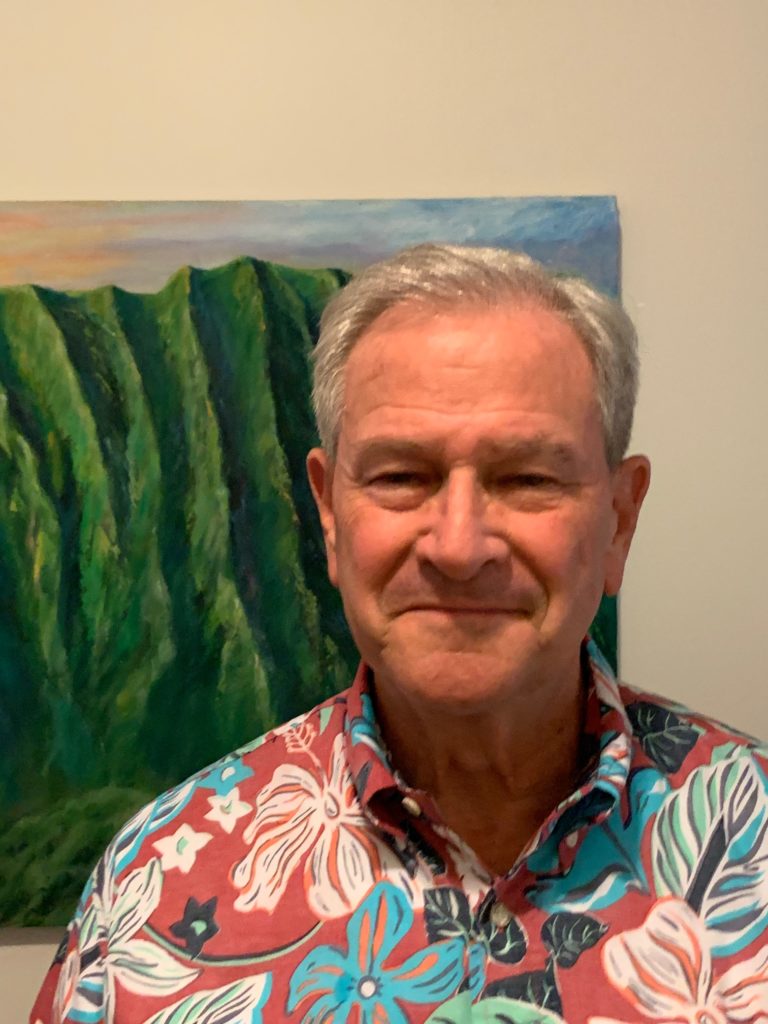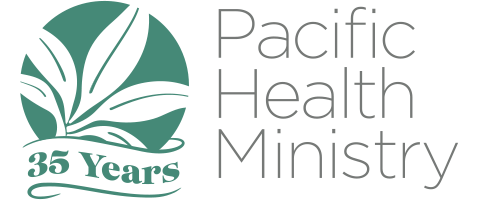“The more time that passes, the more I remember that safe space and the lessons learned. Individual memories tend to fall away and what is left is the feeling of closeness I shared with everyone.”
-Preston Lentz
 In 2018, CPE alum Preston Lentz was a part of Pacific Health Ministry’s first distance cohort. Describing the program as “one of the most meaningful things [he] has ever done in [his] life,” his training at PHM would propel him on his journey as an Episcopal Priest. While currently working full-time for a financial services firm in Honolulu, he continues to volunteer weekly as a Priest Associate. In his profile, Lentz so eloquently explains the offerings of CPE, functioning as the roots of his spiritual foundation, which have only grown throughout the years.
In 2018, CPE alum Preston Lentz was a part of Pacific Health Ministry’s first distance cohort. Describing the program as “one of the most meaningful things [he] has ever done in [his] life,” his training at PHM would propel him on his journey as an Episcopal Priest. While currently working full-time for a financial services firm in Honolulu, he continues to volunteer weekly as a Priest Associate. In his profile, Lentz so eloquently explains the offerings of CPE, functioning as the roots of his spiritual foundation, which have only grown throughout the years.
Why did you decide to enroll in CPE?
I was going through the ordination process to become an Episcopal Priest. I found out about six weeks before that process ended that according to the Canons of the Episcopal Church of the United States, I had to have one full unit of Clinical Pastoral Education. I thought that meant I would show up at a hospital like Queens and immediately begin the process. The Dean of our program then informed me of PHM and their CPE course designed for people going through the formational ordination process.
I did not know the organization existed until that conversation. I then got the application form and filled it out. The first weekend in February 2018, I was at the PHM offices as part of the first long-distance CPE cohort. There were 8 in the program, four on Oahu, and four scattered throughout the state. We would meet once a week by Zoom and spend two or three hours together going through the process of unpacking what had happened to us the prior week.
What particular program did you participate in?
I took the very first unit of CPE and was a part of the first distance cohort. I am a Bivocational Priest in the Episcopal Church, so everything I did in that first unit had to be tied to what I do professionally. Additionally, there were people in the course who were taking it for the third or fourth time.
Did you have any preconceived notions about CPE?
Yes, I did. I had three priests who were mentors to me tell me that it was necessary and would be terrifying, but . . .the best thing I could ever do. They told me I should look forward to it. I was told it was a terribly emotional program that would be one of the most formative ordination processes of my life as a priest.
What was the CPE program like?
We met every Wednesday afternoon for six months from three to six via zoom. We were in a rotation so that we would all share something about what happened to us the prior week to start the class. Afterward, two of us in the group would then share our experiences in whatever pastoral environment we were in. Almost all of us were working in hospital settings. When it was my turn to share, I would go back over all my interactions with doctors, nurses, or patients. I would bring to the group those one or two instances that had either caused the greatest fear in me or the greatest anger and frustration. Then, as a group, we would discuss why those emotions came up. It was always about how I responded and why.
The process was to help me learn to get my ego out of the way to help other people. The patients are the ones in emotional strife, not me. We were taught early on that we would never fully comprehend how a patient is feeling. It was training me to understand what gets in the way of me best helping the patient. There were always people ready and willing to help me work through my emotions.
What personal discoveries did you have during CPE?
I learned a couple of things; one was physical while the other was psychological or rather emotional. I needed to let go of things that happened to me during my life. The golden rule is to love others as you love yourself. What CPE does is teach you about both aspects. If I can’t figure out how to love myself, it is tough for me to deal with someone else meaningfully. To love someone else, I need to love myself meaningfully. To meaningfully love myself, I need to love others. These are lessons that CPE teaches you.
The fascinating physical thing I learned happened while working downtown during my CPE training at Queen’s Hospital. Every week, I would drive from our office and park far away, ultimately walking to the hospital. That, for me, was a terrifying walk. It was scary, nerve-wracking. After about two months there, I ran late one day and had to park in the parking structure. That day while walking down a corridor to get into the hospital, I felt a sense of belonging, and the fear and anxiety I felt parking outside the hospital disappeared. I felt like the holy spirit was with me. I was astonished at the impact that physical difference had on me.
CPE has allowed me to look at myself and the burdens I have been carrying with me all my life to put them aside to be a better pastor to others. It is such a powerful impact.
Current Job and CPE impact?
I am still working full-time for a financial services firm in Honolulu. I spend eight to fourteen hours a week at St. Christopher’s Episcopal Church on the Windward side as a Priest Associate. CPE professionally has made me aware of when I begin to interject myself into situations and why I must step away to truly listen to somebody and hear what their pain is and what their struggles are. The other thing it taught me is I don’t have a superhero cape. However, I can show up and help to the best of my ability to provide support, comfort, and care. CPE has been one of the most meaningful things I have done in my entire life.
What would you like others to know about CPE?
I would like anyone considering the program to know that Pacific Health Ministry is a beautiful organization. They are affirming, supportive, caring. The CPE program was precisely what I was told it would be, terrifying, scary, challenging. However, it is one of the most powerful things someone can do in their life–it will be life-altering for many people.
There are learning moments all the way around that I look back on with great pleasure. One of my cohorts gave an outstanding presentation on the difference between sympathy and empathy that was profoundly moving for me and will stay with me for the rest of my life. Imagine that someone is stuck in a hole. The sympathetic person is up at the top and looks down and says, “I see you down there, and I now understand how you must feel.” Someone empathetic says, “hold on just a minute, I’ll get a ladder, and I am going to come down there with you.” That is one of the things I remember with great fondness.
The CPE program became a safe place for all of us where we could share our experiences. The more time that passes, the more I remember that safe space and the lessons learned. Individual memories tend to fall away and what is left is the feeling of closeness I shared with everyone.
Life during Covid?
Before the shutdowns, our company was on the cutting edge of preparing for the pandemic, so we knew exactly what we were going to do. During the first four months of working from home as a family, my wife and I would have lunch together every day and do a crossword puzzle, which was beautiful. It was an absolute blessing to be able to spend time with her. I also was able to get more exercise, read, and do things for the Church and my spiritual life. I also continued as an on-call Chaplain at Queen’s until last November.
